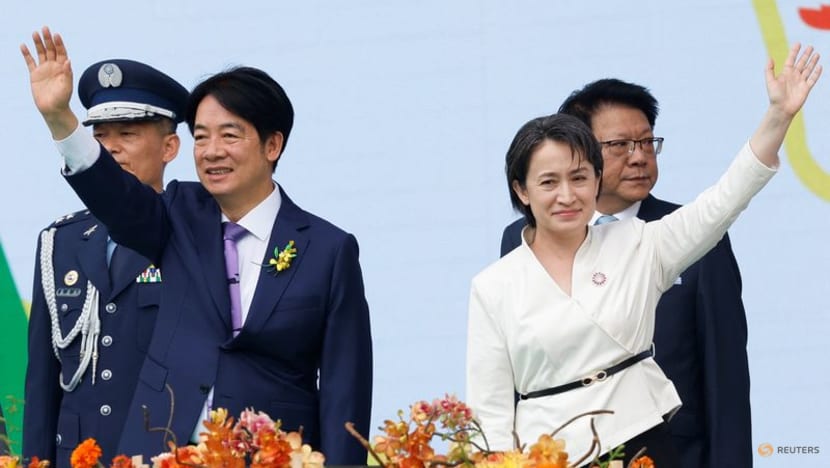Commentary: Reading between the lines of Taiwan President William Lai’s inauguration speech
Taiwan’s new President William Lai was sworn in on Monday (May 20). NUS political scientist Chong Ja Ian looks at how he will handle ties with China.

Taiwan's new President William Lai Ching-te and new Vice President Hsiao Bi-khim wave during the inauguration ceremony outside the Presidential office building in Taipei, Taiwan on May 20, 2024. (Photo: Reuters/Carlos Garcia Rawlins)

This audio is generated by an AI tool.
SINGAPORE: Going into the inauguration, there were concerns that new Taiwan President William Lai Ching-te would act to provoke Beijing, given that earlier in his political career, Mr Lai described himself as a "pragmatic worker for Taiwan independence".
Beijing stoked these concerns from as early as last year’s presidential election campaign by branding Mr Lai as a pro-independence "troublemaker" who would bring war to Taiwan.
In his inauguration speech on Monday (May 20), Mr Lai projected a vision of a confident, international and forward-looking Taiwan that is determined to be a force for peace and prosperity, not just in the region but also the world.
Mr Lai, whose election victory in January gave an unprecedented third presidential term to the Democratic Progressive Party (DPP), also emphasised the democratic values that Taiwan shares with many of its closest partners.
These remarks built on the remarkable success Taiwan enjoyed under Mr Lai’s predecessor, Tsai Ing-wen. Under Ms Tsai’s leadership, Taiwan has enjoyed a more positive global profile and noteworthy economic growth, with the latest data showing a 6.51 per cent year-on-year expansion in the first quarter. Ms Tsai left office with a higher approval rating than the past two presidents.
As Ms Tsai’s vice-president for the past four years, Mr Lai is looking to take advantage of the existing momentum. Stability, especially in relations with China, is a big component of the legacy Mr Lai inherits, and his speech spelt out a clear intention to maintain the status quo.
CONCILIATORY ENOUGH?
Mr Lai stated unequivocally in his speech that he does not seek to change the status quo, where Taiwan enjoys substantive autonomy in all matters but does not declare formal independence or separation from a notional China.
Mr Lai further emphasised that his administration is willing to accept working with any term for Taiwan that gives it sufficient dignity, peppering his speech with references to the "Republic of China" (ROC), Taiwan’s official name.
At the same time, Mr Lai said the two sides of the strait were "not subordinate to each other" and called on Beijing to stop coercing and bullying Taiwan and to instead engage on terms of mutual respect while underscoring Taiwan’s engagement with the world, themes previously touched on during the election campaign.
Leaders in Beijing are unlikely to heed this call and have indeed announced military exercises to "punish" what they claim is in response to "separatist acts".
Importantly, unlike Ms Tsai when she became president, Mr Lai did not make indirect reference to the "1992 Consensus" in his speech.
The supposed consensus - an unofficial understanding that Taipei and Beijing agree there is only "one China", but the two sides may disagree as to its meaning - was formally adopted as policy by the Kuomintang’s Ma Ying-jeou when he secured the presidency in 2008. Beijing has never acknowledged Mr Ma’s framing of the "1992 Consensus" in terms of "one country, different interpretations".
Mr Lai’s DPP disagreed as to whether there was a consensus, but Ms Tsai in her inauguration speech in 2016 said she "respect(s) this historical fact" that quasi-official meetings occurred, and indicated a willingness to adhere to the broad spirit of cross-strait cooperation.
Of further note is Mr Lai’s direct reference to China as "China" rather than "mainland" or "the other side of the Strait", which Beijing is likely to read as separatism. His predecessors generally avoided directly using the term "China" when referring to the country.
Repeated references to the ROC and an explicit acceptance that Taiwan will work with whatever name proves most convenient to its partners indicates Mr Lai’s openness to compromise. However, Mr Lai’s references to "China" and avoidance of discussion about the "1992 Consensus" reflects an uneasiness about PRC efforts to re-define these concepts in terms of Beijing’s "one China principle".
A DIVIDED GOVERNMENT
Undergirding Mr Lai’s cross-strait position is a greater sense of comfort in Taiwan about being Taiwanese.
Across multiple opinion polls, roughly 90 per cent of respondents see themselves as Taiwanese in some way with about two-thirds exclusively so. Concurrently, more than 85 per cent of people in Taiwan consistently express a wish to maintain the status quo whatever their aspirations for Taiwan’s ultimate status. The most recent poll by Taiwan’s Mainland Affairs Council puts this figure at 88.8 per cent.
That is probably as close to an actual consensus as feasible in a rambunctious democracy like Taiwan. The language in Mr Lai’s speech reflects these conditions, even if they form a reality that Beijing does not like to hear about.
For all the international and cross-strait aspects of the inaugural speech, Mr Lai began his remarks referencing a need for the various political parties in Taiwan to cooperate.
This acknowledges the fact that while the DPP holds onto the presidency, the KMT and the Taiwan People’s Party (TPP) together have an 11-seat majority in the legislature.
A divided government is probably Mr Lai’s first major challenge. Efforts by the KMT and TPP to railroad through an expansive "contempt of the legislature" Bill alongside a massive road construction Bill already led to confrontations in the Legislative Yuan the Friday before the inauguration.
An estimated 30,000 people further turned up around the Legislative Yuan the day after the inauguration to protest these Bills, with further stand-offs being very likely in the days and weeks ahead.
CALM AS STILL WATER
Mr Lai comes to office at a tumultuous moment. Beijing is becoming more strident about its territorial claims and prerogatives, whether in the South China Sea, East China Sea, Yellow Sea, or Taiwan Strait. Then there is increasing friction between China on one side and the United States and its allies on the other, in areas ranging from economics to security.
Then there is domestic politics, with the KMT possibly coordinating with the Chinese Communist Party across the Taiwan Strait in some capacity.
Opponents of Mr Lai and the DPP are likely to seize on any mistakes to label him as a destabilising troublemaker to isolate him internationally and domestically.
The key test for Mr Lai is the degree to which he can navigate these waters calmly, resolutely, and effectively without lashing out in frustration, and in this regard follow the unflappable Ms Tsai.
Chong Ja Ian is Associate Professor of Political Science at the National University of Singapore and a non-resident scholar at Carnegie China.

















